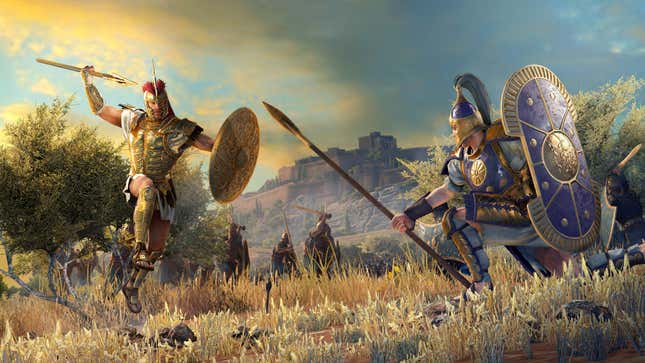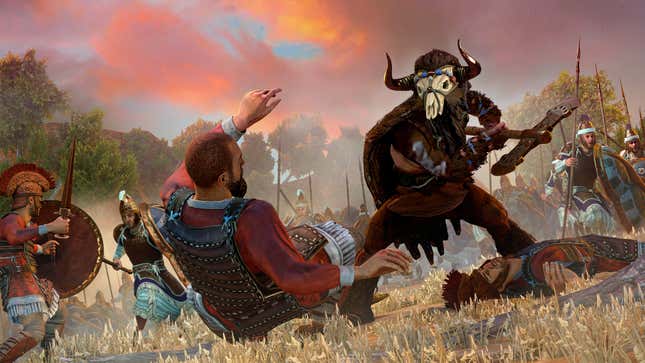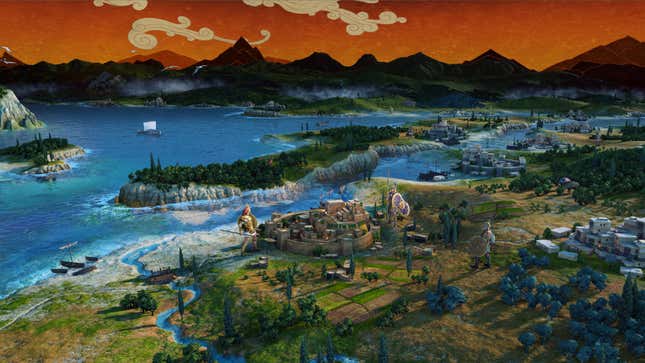Total War is a series whose games can swing wildly between “all-time classics” and “oh no”. So a few years back, developers Creative Assembly had a very good idea: in between major releases, they’d work on smaller, more experimental games, where they could test new ideas and features before rolling them out into the bigger, mainline series.
The first one was called Thrones of Britannia, and it sucked! It was, as I described it at the time, a “complete mess”, missing much of what makes a bigger Total War so much fun, and bringing in a bunch of weird, new mechanics that sometimes just didn’t sit right at all.
However, in the long run Thrones’ sacrifices turned out to be worth something, because the new mechanics that did work (like army mustering) made it into the next proper Total War game, Three Kingdoms, and helped make it excellent.
Now, a couple of years later, we’ve got the second of these testbeds, A Total War Saga: Troy. The basic idea is the same: release a smaller, lighter Total War that has a faster developmental turnaround (and a unique pricing strategy, in that it was free for 24 hours on the Epic Games Store, a deal that 7.5 million people took them up on).
But this time around, other parts of the brief seem to have changed. Rather than going wild with experimental ideas like Thrones of Britannia did, Creative Assembly seem to have reacted to that game’s shortcomings and played it much safer here.

I’m not sure I’m digging that decision. In hindsight, as harsh as I was on Thrones, its throw-spaghetti-at-the-walls approach to its design at least had a long-term purpose, and a year later ended up helping bring us one of the best Total War games of all time. Troy by contrast just feels like another Total War.
Not that there’s anything wrong with that! Total War is one of my favourite series, and I enjoyed my time with Troy. But I also found that once I was done with it for professional purposes I never went back and played it for fun, because there wasn’t anything there that would compel me to pick it over a Warhammer game or Three Kingdoms.
Set during the Trojan War, Troy splits the difference with its mythological setting. While the series has long gone off-piste when it comes to historical accuracy—from Warhammer’s fantasy setting to Three Kingdom’s fictional leanings—here Troy can’t make up its mind whether it wants to be a Bronze Age game or a game about a story that involves Gods and monsters.
At a strategic level, the Gods exist, and you can curry their favour and earn blessings that provide you advantages in battle. But on the battlefield, while you there are hero units like “Minotaurs”, they’re not actually monsters, just a dude in costume, as though the legends grew not from myth but from exaggerated re-tellings of the tales of some big hairy blokes.

Troy is pretty straightforward if you’ve played a Total War game in the last ten years (or ever for most parts, really). Split between a strategic overworld map and tactical battles, you’re tasked with building improvements in regions and securing resources in the former, while directly commanding your armies in enormous real-time combat in the latter.
Maybe it’s a little too straightforward. Aside from earning some favours from the gods and yet another fresh attempt at creating a satisfying endgame (which works pretty well here), so much of the moment-to-moment play is just your standard Total War stuff, only without the extra depth and spice you get in a bigger, standard release.
Then in other areas, we get too much to do. Agent units, which have been a colossal pain in the ass since the beginning of the series, have somehow made a return after Three Kingdoms wisely removed them, while on the campaign map you’re interrupted constantly by an incessant array of pop-up events and tiresome diplomatic book-keeping, both of which had also been streamlined over the last few releases.
This was bad old shit that Total War was better without. It didn’t need to come back here when there was scope to try some crazy new stuff!
Troy then has to lean on its Troyness, which aside from some interesting character stuff when selecting your faction, doesn’t provide much until you get near the end of the game. I was really bummed out by the lack of unit—and even faction—variety here (even if it is to be expected), and the busywork coupled with a lot of sieges make the early stages of the game a real slog. It makes it a chore to work your way towards the more interesting endgame, which involves mustering your forces and crossing the sea to take on the other side of the map.

At least the map is gorgeous, which is more important than it might sound. You do nothing more frequently in a Total War game than just stare at the map, and an ugly and/or boring one can really bring the whole game down (see: Rome 2). Thankfully Troy’s is magnificent, marrying crisp blue Mediterranean seas with a skybox designed to mimic Ancient Greece’s trademark red-figure style, so it was a joy shuffling my forces around while playing.
There’s nothing wrong with Troy in the same way there was with Thrones. It’s a perfectly capable, if more shallow Total War experience, that would have been right at home had it released alongside Shogun 2 or Rome 2. It looks amazing, provides a somewhat fresh setting for the series (it’s never gone back this far in time before) and if all you want to play is another Total War, differences or uniqueness be damned, then this is certainly another Total War. It’s just not much more than that.